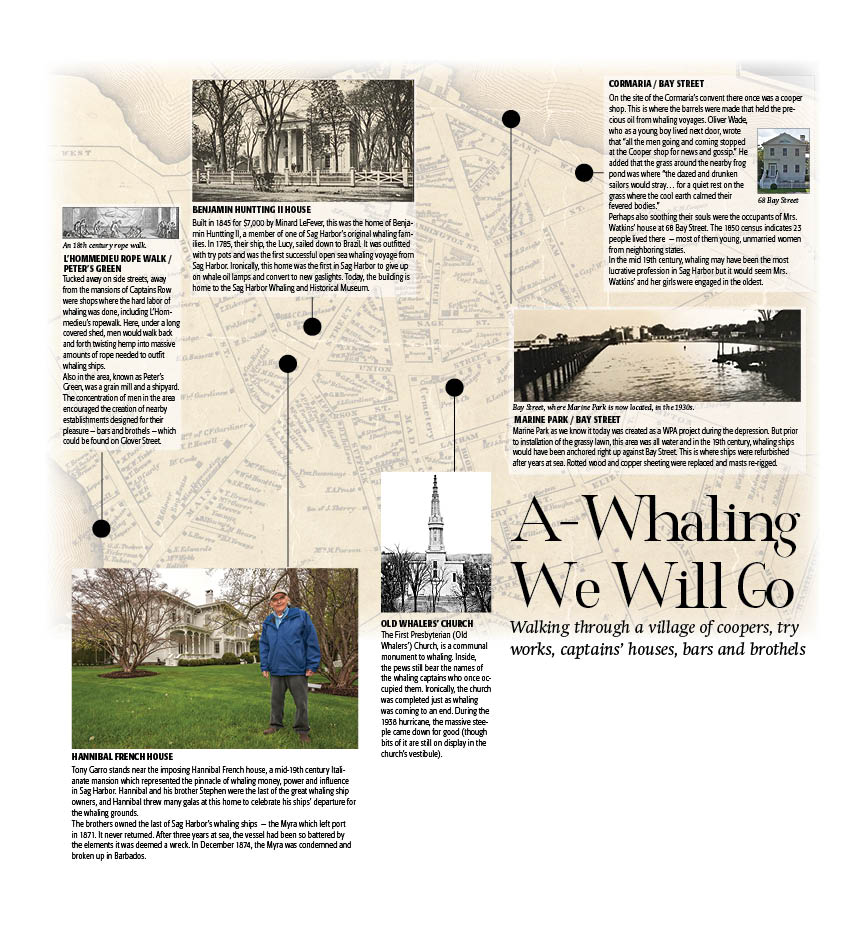
By Annette Hinkle
Tony Garro is passionate about Sag Harbor history. He has spent the better part of several years researching the village’s past and enthusiastically shares it with the people who join him on his historic walking tours.
Mr. Garro will be at it again on Thursday, May 12 when he leads a maritime walking tour for the Southampton Historical Museum. This time, the topic will be Sag Harbor’s whaling history — an industry that conjures up images of adventure, intrigue and daring on the high seas.
“It was such an over the top enterprise. Where the hell do you get the nerve to get in a 20-foot-long whale boat with six guys and think you’re going to kill a sperm whale with a spear?” asks Mr. Garro. “To think of the concept and do it is so over the top.”
Also over the top were the fortunes whale oil brought to Sag Harbor, which are evident along Main Street’s “Captains Row” where impressive mansions like the Hannibal French House and the Huntting House (now the Sag Harbor Whaling Museum) still dominate the village’s streetscape and imagination.
Mr. Garro notes that another prime example of whaling hutzpah is the Old Whalers’ Church, an imposing edifice built with whale oil money in 1845 that once had an imposing 168-foot steeple to match.
“It’s an ‘in your face’ display of obvious wealth and influence,” says Mr. Garro. “You talk about hubris. The only reason you’d put up a steeple like that is that you can do it. They did it. And to make sure you got it, they put decorative whaling spades on the eaves of the roof.”

Whaling may be an era that looms large in imaginations, but in truth, it had a fairly short heyday, lasting only around 50 years in Sag Harbor. Ironically, the church was completed just as whaling was coming to an end here, the result of over harvesting, the California gold rush and changing times. In 1859, the discovery of petroleum in Pennsylvania further sealed the village’s fate. Even the steeple did not last. It came crashing down in the hurricane of 1938.
While whale ship owners saw their fortunes decline with the industry, for every Sag Harborite at sea, there was another back home toiling to keep the wheels of the whaling industry turning. The decline must have been devastating for workers and their families, and while visitors to Sag Harbor tend to focus on whaling’s grand mansions, Mr. Garro notes there are other remnants of the industry where people of far lower stature toiled in hard labor to survive. Among them are sites on Bay Street and Glover Street — today home to some of the priciest real estate in the village, but during the whaling era, definitely on the wrong side of the tracks.
These were waterfront areas where men worked in the dirty business of supplying whale ships. Cooperages made barrels for storing whale oil at sea, while at facilities called rope walks, men braided twine by hand to create the miles of ropes for ship rigging, and at Marine Park, which in the 19th century was part of the harbor, ships were repaired and refitted between voyages.
Always within a short distance of these shops would be what Mr. Garro likes to call the “B&B’s” — bars and brothels — which serviced the workers in more ways than one. But as Sag Harbor’s fortunes began to plummet with the decline of whale oil, people at all levels in the village suffered, from ship owners and captains to widows and children.
“Sag Harbor had 4,000 residents at the height of whaling in the early 1840s,” says Mr. Garro. “Within 10 years, it had lost probably lost half of its population.”
It seems like the dependency on oil — be it whale or otherwise — has a cautionary tale to offer, which begs the question. Given today’s current climate of falling oil prices, does Mr. Garro see any parallels to Sag Harbor’s whaling industry of the 19th century?
“Absolutely. When you have a capitalist market economy, life is going to be affected by the economy,” he says. “You’ll have ups and downs. When oil was plentiful, prices went up, money flowed and many families made huge amounts. The thing you have to realize is, what goes up must come down.”
“As the price of whale oil declined and Sag Harbor’s position as a whale oil center declined, property values went down and people were put out of work,” he adds.
Perhaps that fact is illustrated best in the story of George and Sarah Howell. George was a whaler and the couple bought their dream house on Bay Street in 1843 for $3,700. In the years that followed, George spent longer periods away from home yet made less money on each voyage. In 1850, he died at sea of cholera. Sarah, now widowed, was forced to move in with her mother. She rented out the house, which was conveniently across the street from the cooper’s shop, to a woman named Mrs. Mary Watkins who plied her own version of the whaling trade by opening a house of ill repute.
In 1854, Sarah finally sold the house — for $700.
Tony Garro’s Maritime Walking Tour of Sag Harbor begins at 11 a.m. on Long Wharf. The cost is $10. To register call the Southampton Historical Museum at 283-2494. The walk is co-sponsored by the Rogers Memorial Library.